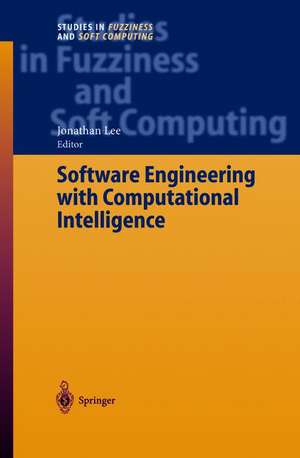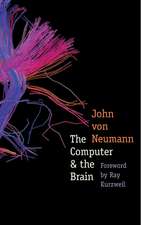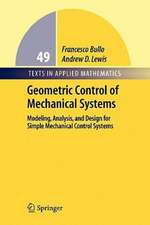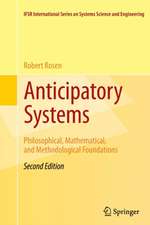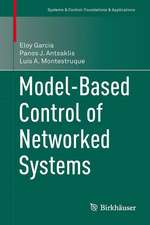Software Engineering with Computational Intelligence: Studies in Fuzziness and Soft Computing, cartea 121
Editat de Jonathan Leeen Limba Engleză Hardback – 19 mar 2003
| Toate formatele și edițiile | Preț | Express |
|---|---|---|
| Paperback (1) | 943.88 lei 6-8 săpt. | |
| Springer Berlin, Heidelberg – 8 dec 2010 | 943.88 lei 6-8 săpt. | |
| Hardback (1) | 948.61 lei 6-8 săpt. | |
| Springer Berlin, Heidelberg – 19 mar 2003 | 948.61 lei 6-8 săpt. |
Din seria Studies in Fuzziness and Soft Computing
- 20%
 Preț: 999.85 lei
Preț: 999.85 lei - 20%
 Preț: 653.06 lei
Preț: 653.06 lei - 20%
 Preț: 872.98 lei
Preț: 872.98 lei - 20%
 Preț: 930.57 lei
Preț: 930.57 lei - 20%
 Preț: 1051.00 lei
Preț: 1051.00 lei - 20%
 Preț: 992.44 lei
Preț: 992.44 lei - 20%
 Preț: 655.85 lei
Preț: 655.85 lei - 20%
 Preț: 1001.86 lei
Preț: 1001.86 lei - 18%
 Preț: 954.14 lei
Preț: 954.14 lei - 20%
 Preț: 330.10 lei
Preț: 330.10 lei - 20%
 Preț: 333.04 lei
Preț: 333.04 lei - 20%
 Preț: 997.56 lei
Preț: 997.56 lei -
 Preț: 391.61 lei
Preț: 391.61 lei - 20%
 Preț: 647.79 lei
Preț: 647.79 lei - 20%
 Preț: 986.01 lei
Preț: 986.01 lei - 18%
 Preț: 958.56 lei
Preț: 958.56 lei - 20%
 Preț: 996.40 lei
Preț: 996.40 lei - 20%
 Preț: 999.35 lei
Preț: 999.35 lei - 15%
 Preț: 646.43 lei
Preț: 646.43 lei - 20%
 Preț: 651.57 lei
Preț: 651.57 lei - 20%
 Preț: 997.89 lei
Preț: 997.89 lei - 15%
 Preț: 641.03 lei
Preț: 641.03 lei - 20%
 Preț: 1009.74 lei
Preț: 1009.74 lei - 20%
 Preț: 992.62 lei
Preț: 992.62 lei -
 Preț: 388.72 lei
Preț: 388.72 lei - 18%
 Preț: 1223.43 lei
Preț: 1223.43 lei - 20%
 Preț: 651.42 lei
Preț: 651.42 lei - 18%
 Preț: 951.59 lei
Preț: 951.59 lei
Preț: 948.61 lei
Preț vechi: 1156.84 lei
-18% Nou
Puncte Express: 1423
Preț estimativ în valută:
181.54€ • 197.12$ • 152.49£
181.54€ • 197.12$ • 152.49£
Carte tipărită la comandă
Livrare economică 22 aprilie-06 mai
Preluare comenzi: 021 569.72.76
Specificații
ISBN-13: 9783540004721
ISBN-10: 3540004726
Pagini: 292
Ilustrații: XI, 270 p.
Dimensiuni: 155 x 235 x 21 mm
Greutate: 0.54 kg
Ediția:2003
Editura: Springer Berlin, Heidelberg
Colecția Springer
Seria Studies in Fuzziness and Soft Computing
Locul publicării:Berlin, Heidelberg, Germany
ISBN-10: 3540004726
Pagini: 292
Ilustrații: XI, 270 p.
Dimensiuni: 155 x 235 x 21 mm
Greutate: 0.54 kg
Ediția:2003
Editura: Springer Berlin, Heidelberg
Colecția Springer
Seria Studies in Fuzziness and Soft Computing
Locul publicării:Berlin, Heidelberg, Germany
Public țintă
ResearchCuprins
to Software Engineering with Computational Intelligence.- Fuzzy Concepts and Formal Methods.- Trade-off Requirement Engineering.- A Generalized Object-Oriented Data Model Based on Level-2 Fuzzy Sets.- Modelling Imperfect Spatial Information in a Fuzzy Object Oriented Database.- Using Classical Object-Oriented Features to Build a Fuzzy O-O Database System.- Domain Analysis for the Engineering of Spatiotemporal Software.- Object-Oriented Framework of Fuzzy Knowledge Systems.- Fuzzy Evaluation of Domain Knowledge.- Application of Fuzzy Rule Extraction to Minimize the Costs of Misclassification on Software Quality Modeling.- Processing Software Engineering Data: Granular-based Approach.
Textul de pe ultima copertă
This edited book invites the reader to explore how the latest technologies developed in computational intelligence can be extended and applied to software engineering. Leading experts demonstrate how this recent confluence of software engineering and computational intelligence provides a powerful tool to address the increasing demand for complex applications in diversified areas, the ever-increasing complexity and size of software systems, and the inherently imperfect nature of the information. The presented treatments to software modeling and formal analysis permit the extension of computational intelligence to various phases in software life cycles, such as managing fuzziness resident in the requirements, coping with fuzzy objects and imprecise knowledge, and handling uncertainty encountered in quality prediction.
Caracteristici
State of the art of technologies developed in computational intelligence applied and extended to software engineering Presentation of software systems dealing with complex applications and imprecise and uncertain information
